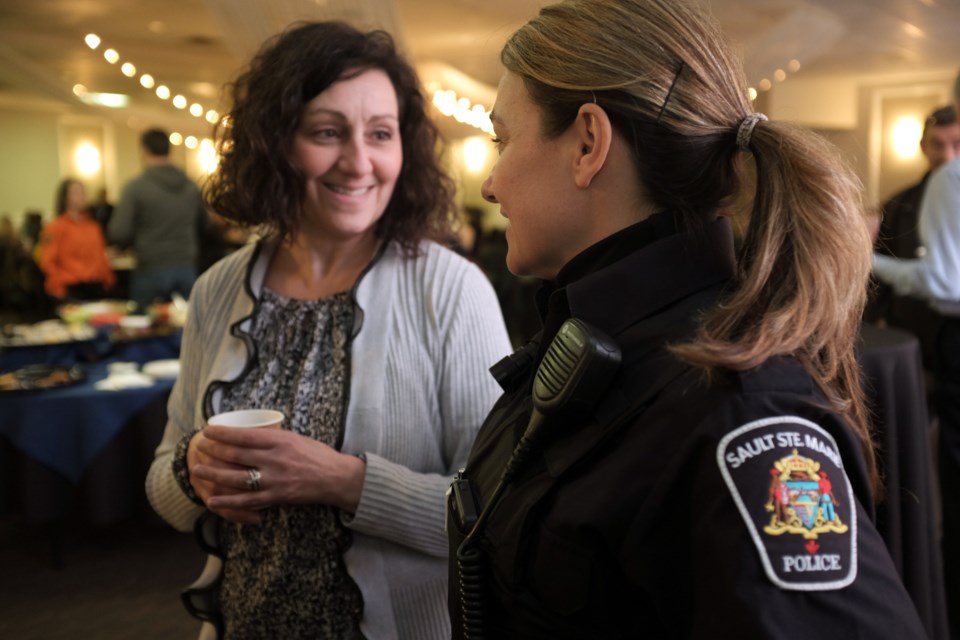Former private investigator turned autism advocate and law enforcement liaison Dennis Debbaudt presented to 125 public safety professionals on Tuesday about on-the-job techniques to recognize individuals with autism and how to interact with them.
Before becoming involved with autism advocacy Debbaudt was a private investigator and freelance investigative reporter.
Autism became a part of Debbaudt’s life when his young son was diagnosed with it in the late 80s and he started having contact with police that he was “unprepared for.”
Debbaudt cites a time when he had to leave a mall because his son started becoming upset and was screaming and crying while customers and mall staff looked at them.
“I got him settled down and to a quiet place and we were going to go home. By the time I had him in the car seat I was surrounded by police who started quizzing my son - who couldn’t communicate with them at the time - about who I was. They said they had received multiple reports from a toy store in the mall of a possible child abduction,” he said.
This experience and several similar ones prompted him to seek out information on how police and public safety providers could better interact with people with autism.
“I found that information didn’t exist and so that became a mission,” he said.
OPP from Wawa and Chapleau, Search and Rescue from Sudbury, Michigan State Police, firefighters, and Station Mall security guards were among those who attended Debbaudt's Autism Recognition and Response Training Session at Grand Gardens.
Debbaudt started his research in 1991 and since then has written extensively on the subject including a full length book, articles for publications like the International Association of Chiefs of Police and The FBI Law Enforcement Bulletin, as well conducting the world’s first training session for police on Autism in 1995 in Detroit.
“Since the early 90s to now the rate of autism has dramatically increased. In the 80s autism was found in every two to five people out of 10,000; now the rate in America is one in 68 people,” said Debbaudt.
Debbaudt also said that statistically, people with autism are seven times more likely to have contacts with police and public safety workers.
These contacts can often be as victims, perpetrators, or witnesses and often various signals people with autism give off might confuse police.
“They may get brutally close to you or they may want to get away from you. Also, they may not be verbal or they may not want to look you in the eye. It’s a classic tell of a guilty person that they won’t look you in the eye but this is also a common characteristic of a person with autism. However, each person is going to be unique and different in how they present their autism,” said Debbaudt.
Debbaudt said that some people with autism are in need of constant care from another adult and if they break away from that care they can be vulnerable.
“They can drown, get hit by a car, become a missing person, enter the homes of others - really high risk,“ he said.
Debbaudt said there are current campaigns around Ontario to register vulnerable persons with autism with local 9-1-1 services.
“If emergency services get a call to the home (responders) already have information about how to interact with this person, like how to calm them down and what their favourite topics are,” said Debbaudt.
Some techniques to deal with a person with autism might be giving them more time during interactions, using simplified verbal commands, and using pictures or objects to help facilitate communication.
Constable Michelle Johnson with the Sault Ste. Marie Police Service attended the event to improve her role as a high school liaison officer where she said she frequently works with children who have autism.
“An interesting thing we learned today was about light sensitivity and how kids with autism will wear hats because lights sometimes cause sensory pain for them. I always knew there were triggers but this was new to me. Now, relating that to my job, if I ever bring someone in for an interview I might turn a light off or offer someone to go get their hat,“ she said.
Debbaudt was brought to Sault Ste. Marie by the Algoma Autism Foundation (AAF), which offered the event at no charge to attendees.
Debbaudt also did an evening talk for about 50 parents and teacher.
Other groups that attended the presentation included Ontario Lottery and Gaming Corporation, Customs and Border Protection, Norpro Security, Huron Superior Catholic District School Board, Algoma District School Board, Alcohol and Gaming Commission of Ontario, The Ministry of Natural Resources and Forestry, North Shore Search and Rescue, Walmart Security, and many other groups.
